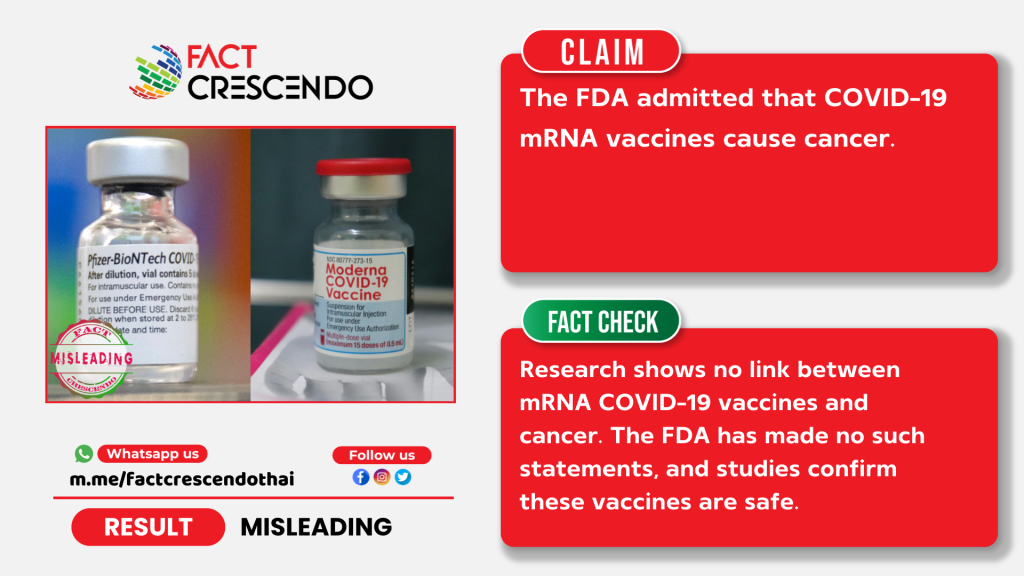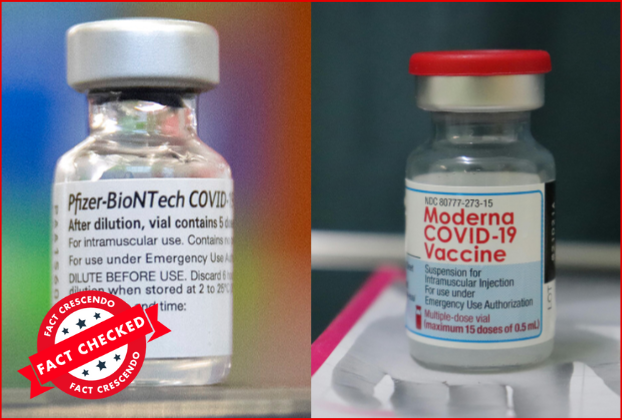
Claims linking mRNA COVID-19 vaccines to cancer have recently resurfaced on social media platforms, suggesting that the FDA has admitted a connection between Pfizer and Moderna’s mRNA vaccines and cancer.
Social Media Claim
Multiple Facebook users have recently shared posts with the headline “FDA Admits Covid mRNA Vaccines Cause Cancer.”
The claim originates from a Slay News article (Archive) published in February 2025. The article discusses findings regarding DNA presence in Pfizer and Moderna’s mRNA Covid-19 vaccines and suggests potential health implications.
Fact-check
What Does the FDA Say?
The FDA has not issued any public statement explicitly admitting that mRNA vaccines cause cancer. As reflected in its communications on vaccine safety (e.g., FDA’s Covid-19 vaccine safety updates), the agency’s official stance is that Covid-19 vaccines, including mRNA-based ones from Pfizer and Moderna, underwent rigorous testing and continue to be monitored for safety. The FDA acknowledges rare side effects, such as myocarditis in young males, but cancer is not listed among them (Source).
The Slay News article references “an FDA study” regarding “excess DNA contamination” but does not provide specific citations to FDA press releases, documents, or spokespersons to support its claims about an “admission.”
Moreover, The FDA has recently approved new versions of the mRNA COVID-19 vaccines from Moderna and Pfizer-BioNTech for 2024-2025. These updated vaccines specifically target the Omicron KP.2 variant that’s currently spreading. Since protection from previous vaccines or infections can decrease over time, the FDA recommends eligible people get this updated shot. The new vaccines were thoroughly tested for safety and effectiveness, using the same reliable manufacturing process as earlier versions. They are designed to protect against the COVID-19 variants that are common right now, and the FDA continues to monitor their performance. Read the full release here.
Additionally, we have contacted the FDA for clarification on this claim and will update this section once we receive a response.
Pfizer and Moderna’s Stances
Here is what each company and regulators have stated:
Pfizer’s Statement: According to Pfizer’s official communications, their studies show no evidence of DNA mutations or cancer risk from their COVID-19 vaccine. During Senate testimony, they addressed questions about DNA sequences used in development, including those related to SV40
While Pfizer has not explicitly addressed claims about DNA contamination causing cancer in their mRNA vaccines, they maintain there is no evidence supporting such claims. The company points to their COVID-19 vaccine’s rigorous testing process, which has revealed no signs of DNA mutation or vaccine-induced cancer. They emphasise their vaccine’s strong safety record across hundreds of millions of recipients worldwide. Pfizer further counters misinformation by highlighting the extensive human clinical trials that were conducted before the authorisation of their vaccine (Source).
Moderna’s Stance: While Moderna has not specifically addressed claims about DNA contamination causing cancer in their mRNA vaccines, they consistently emphasise their product’s safety and efficacy through several key points:
- Safety and Efficacy: Clinical trials and real-world studies of Moderna’s COVID-19 vaccine (mRNA-1273) demonstrate high safety and efficacy in preventing COVID-19, including protection against severe illness and hospitalisation. The WHO and EMA have approved the vaccine for people aged 6 months and older.
- Regulatory Approvals: After thoroughly reviewing Moderna’s vaccine data, the European Medicines Agency (EMA) and other global health authorities have confirmed its safety profile. They note that while myocarditis can occur as a rare side effect—primarily affecting young males after their second dose—these cases are typically mild.
- Long-term Safety Data: Extended studies, including the phase 3 COVE trial, continue to show no new safety concerns, further validating the vaccine’s safety profile.
DNA Contamination Concerns
Some studies and reports have raised concerns about DNA contamination in mRNA vaccines, including the presence of synthetic DNA encapsulated by lipid nanoparticles (see example here). However, regulatory bodies like the FDA emphasise that these concerns are not supported by evidence of harm (Source).
The FDA has addressed concerns about DNA contamination in mRNA vaccines, stating that they consider the totality of the mRNA COVID-19 vaccine product, including lipid nanoparticles, and monitor residual DNA fragments as part of product specifications. They emphasise that animal studies and global surveillance data show no evidence of genotoxicity or harm to the genome (Source).
In addition, the WHO provides guidelines for mRNA-based vaccines, explaining how manufacturers must carefully remove any leftover DNA and other unwanted materials during production. According to these guidelines, the final purified mRNA product needs to meet the same quality standards as other vaccines, with special attention paid to the main vaccine components (Source).
The Paul-Ehrlich-Institut (PEI) has published a report examining DNA contamination concerns in COVID-19 mRNA vaccines. The report points out problems with studies that claimed contamination; many used poorly stored samples and unreliable testing methods that didn’t correctly account for the vaccines’ lipid coating. The report explains that while mRNA vaccines do use bacterial DNA in production, this DNA is carefully broken down and filtered to keep levels within safe limits. The PEI confirms that the remaining bacterial DNA fragments pose no cancer or infection risks. Following standard testing guidelines, they found no evidence that DNA traces in approved vaccines cause any harmful effects, supporting the vaccines’ safety record.
The “Turbo Cancer” Myth
The Slay News piece aligns with a broader narrative about “turbo cancer,” a term popularised online to suggest that mRNA vaccines cause rapid, aggressive cancers. An article from Contagion Live (March 2025), “mRNA COVID-19 Vaccines and ‘Turbo Cancer’: The Latest Myth That Won’t Disappear“, debunks this idea. It explains that this idea came from incorrectly interpreting early research studies and individual patient stories rather than solid scientific evidence. Medical experts, including cancer specialists, point out that cancer typically develops slowly over many years, which contradicts claims about vaccines causing rapid-onset “turbo cancer.”
According to data from the National Cancer Institute (NCI) cancer registries, there has been no significant increase in cancer cases after people received the vaccine. The article also points out that those who claim there is a link often focus on isolated cases of cancer in vaccinated people without considering how many cases usually occur in people who haven’t received the vaccine.
Another article debunking “turbo cancer” from Global Vaccine Data Network reports no Evidence of a Cancer Link. Extensive clinical trials and follow-up studies involving millions of participants have found no increased cancer risk associated with mRNA vaccines.
Expert Consensus
Research from major health organisations shows that mRNA COVID-19 vaccines are safe. Studies by regulatory agencies like the FDA, EMA, and MHRA looked at data from tens of thousands of people and found no major safety concerns. The Pfizer-BioNTech and Moderna vaccines were more than 90% effective, with normal side effects like soreness and tiredness that went away quickly. Scientists have also shown that the mRNA in these vaccines breaks down naturally within days and doesn’t affect our DNA.
Studies focusing on cancer patients, published in respected medical journals, show that the vaccines are safe even for people getting cancer treatment. A 2023 review found no evidence that vaccines make cancer worse or cause new cancers. Ongoing monitoring of vaccinated people worldwide shows no increase in cancer cases or deaths related to the vaccines.
Medical experts agree that the benefits of getting vaccinated against COVID-19 far outweigh any possible risks, especially for people with weaker immune systems. Scientific evidence has proven that claims about DNA damage or “turbo cancer” have been proven false. Major health organisations like the NCCN and WHO continue to recommend vaccination to protect public health and ensure everyone has access to care. (Source: Consensus.app, NCCN, Frontiersin.org)
Conclusion
Research shows that claims about Pfizer and Moderna’s mRNA COVID-19 vaccines causing cancer are not true. Scientists have carefully studied these concerns, especially about DNA contamination in vaccines. Major health organisations around the world have conducted thorough investigations and found no signs that the vaccines increase cancer risk or harm our genes. The safety of these vaccines is supported by extensive research, including clinical trials involving thousands of people, ongoing monitoring of vaccinated individuals, and analyses by medical experts.

Title:FDA Did NOT Admit That Pfizer and Moderna’s mRNA COVID-19 Vaccines Cause Cancer!
Fact Check By: Cielito WangResult: Misleading






